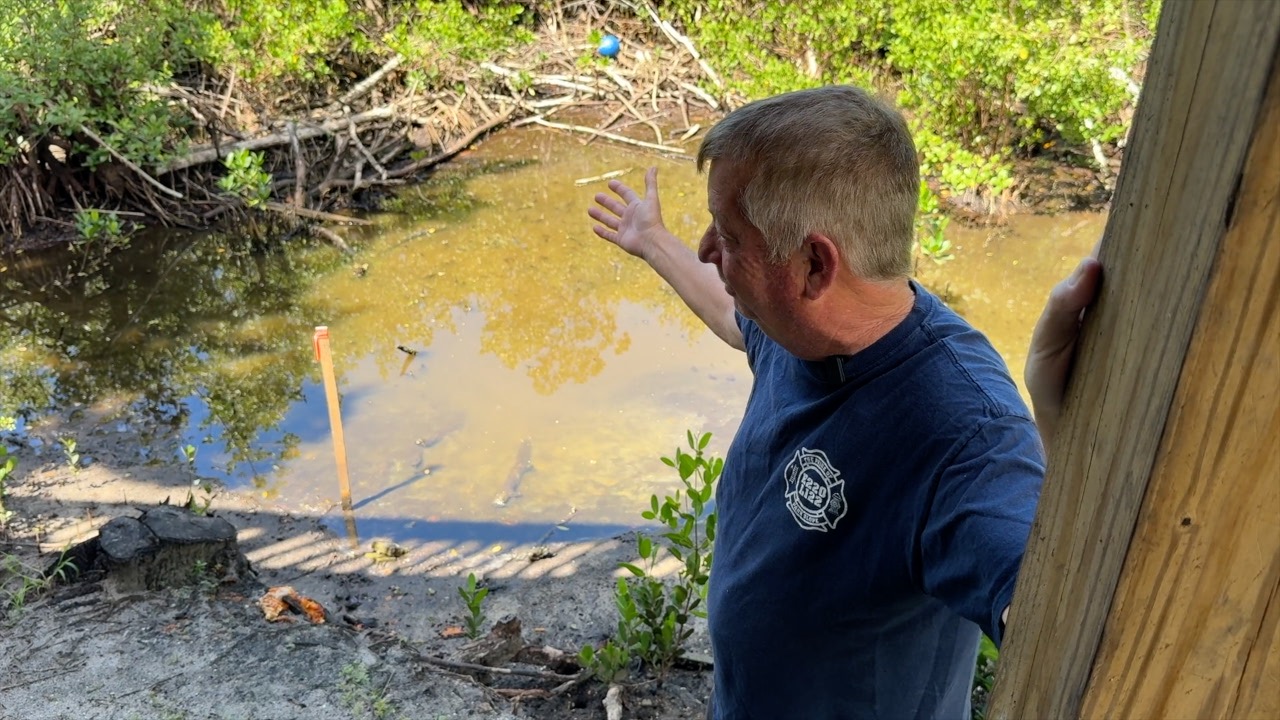PORT RICHEY, Fla. — Richard Sheppard says the creek behind his Port Richey home used to be a peaceful escape.
“It was a beautiful three-foot stream with fish, wildlife. Every day. Beautiful thing to look at,” he said.
But since Hurricane Helene, the water no longer flows. It sits stagnant.
“Today it’s unbearable,” Sheppard said.
WATCH: Port Richey homeowner frustrated with stalled creek repairs since Hurricane Helene
Sheppard believes the creek is backed up, but he has been unable to find anyone to successfully fix it. The storm also eroded the ground behind his property. For months, Sheppard has been trying to determine whether the responsibility lies with the city, his homeowners association, or the Southwest Florida Water Management District.
“The problem is now, the city is saying ok, you own from the pole up, so that’s your responsibility. We don’t know why this is backed up, so right now everything is at a standstill,” Sheppard said.
Sheppard said he fears for the future of his property. He showed the area behind his home, along with a nearby drain that no longer seems to work.
“So this is all algae, full of mosquitoes,” he said.
City officials have made some efforts, including clearing a ditch near the property. Emails reviewed by Tampa Bay 28 show both the mayor and the city manager have been responsive to Sheppard’s concerns, and the city manager even visited the site.
A report commissioned by the city found that stabilizing the creek bank would likely require a wall and that new drainage measures would involve SWFWMD, potentially impacting the entire development. The report also concluded that the responsibility for repairs would fall on the community or individual property owners.
Cases like Sheppard’s are not unusual in Florida, where stormwater runoff and aging drainage systems often create disputes between homeowners, cities, and homeowners' associations. Responsibility can hinge on property boundaries, easements, and whether a waterway is classified as private or public. When multiple entities are involved, as in Sheppard’s case, repairs can be delayed for months or even years while legal and jurisdictional questions are sorted out.
Homeowners in similar situations often must hire private engineers, petition their HOA boards, or seek legal guidance to push for action. Others turn to local governments for assistance, though officials typically limit their involvement to public rights-of-way. In many cases, residents must shoulder the costs of stabilization or drainage fixes themselves, sometimes with partial assistance from grants or special taxing districts.
Sheppard said even if his property was stabilized, the drainage problem would remain. For now, he is waiting on the city’s next response.
Share Your Story with Erik

For more than 15 years, Erik Waxler has called Pasco County home. He’s dedicated to helping his neighbors solve problems and celebrate those who help others. Share your ideas and tips with Erik below.
.

Largo family loses home in morning fire, forced to start over
Mother and her nonverbal son with autism 20 escape safely as the home is condemned; community steps in to help with housing and recovery.





